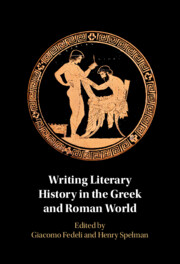Book contents
- Writing Literary History in the Greek and Roman World
- Writing Literary History in the Greek and Roman World
- Copyright page
- Contents
- Contributors
- Introduction
- Part I Between Literature and Scholarship
- Part II Lives and Afterlives
- Part III Narratives of Change
- Chapter 10 Aristotelian Teleology in Literary Criticism
- Chapter 11 Progress and Decline in Roman Perspectives on Literary History
- Chapter 12 The Pleasure of the Text?
- Chapter 13 Plutarch and the History of Greek Poetry
- Epilogue
- Afterword
- Bibliography
- Index Locorum
- Index of Subjects
Chapter 12 - The Pleasure of the Text?
Literacy, Orality and Programmatics in Lucretius
from Part III - Narratives of Change
Published online by Cambridge University Press: 07 June 2024
- Writing Literary History in the Greek and Roman World
- Writing Literary History in the Greek and Roman World
- Copyright page
- Contents
- Contributors
- Introduction
- Part I Between Literature and Scholarship
- Part II Lives and Afterlives
- Part III Narratives of Change
- Chapter 10 Aristotelian Teleology in Literary Criticism
- Chapter 11 Progress and Decline in Roman Perspectives on Literary History
- Chapter 12 The Pleasure of the Text?
- Chapter 13 Plutarch and the History of Greek Poetry
- Epilogue
- Afterword
- Bibliography
- Index Locorum
- Index of Subjects
Summary
Ancient literary-historical narratives commonly envisage developments in poetry and music in terms either of gradual technical progress, or of decadence and hyper-sophistication. This chapter argues that Lucretius strikingly combines these two perspectives in the concluding paragraphs of the culture-history at the end of De Rerum Natura 5: the invention of carmina as songs (5.1379–1411) is associated with simple pleasures, emphatically unsurpassed by later refinements in technique which are linked in turn to the insatiable and destructive desire for novelty and luxury; whereas carmina as (epic?) poems are mentioned amongst the refinements listed in the book’s closing lines as steps on the way to a ‘peak’ (cacumen) of artistic and cultural progress (5.1448–1457). The dual narrative adumbrated here may be linked in turn with the dichotomy between text as written artefact and poem as disembodied ‘song’, which has been a focus of attention in recent scholarship on Latin poetry: both models of textuality, like the conflicting models of cultural development that shape the finale to Book 5, are important to Lucretius’ poetics and his Epicurean didaxis. Lucretius’ poem thus exemplifies the manifold ways in which literary-historical narratives may be determined by the discursive demands of the text in question.
- Type
- Chapter
- Information
- Writing Literary History in the Greek and Roman World , pp. 261 - 281Publisher: Cambridge University PressPrint publication year: 2024

